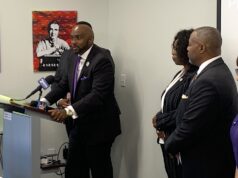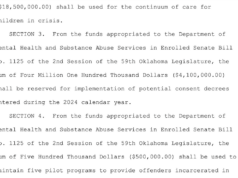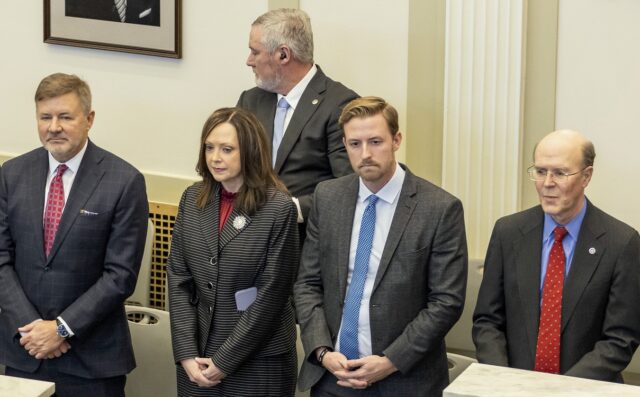

Fall is finally here, and so begins the sacred October tradition of shivering when you leave the house and sweating by the time you come home. While you’re layering up, Brent Swadley remains lawyered up. And as the leaves change, Tulsa is preparing for a change in leadership with a second mayoral candidate debate.
Read more about those developments and more — including a Department of Justice investigation into the Tulsa Race Massacre, new high-speed internet grants to rural areas and a new letter from Attorney General Gentner Drummond criticizing Superintendent of Public Instruction Ryan Walters.
Drummond, Hall send letters to Walters on inhaler issue

In response to a request for a formal legal opinion, Oklahoma Attorney General Gentner Drummond instead issued a letter of counsel to Superintendent of Public Instruction Ryan Walters on Wednesday regarding the State Department of Education’s delay in the purchase of emergency inhalers for public schools. In 2023, the Legislature appropriated $250,000 to place albuterol inhalers and spacers across Oklahoma’s 500-plus school districts. While OSDE received the funds in July of that year, inhalers were not provided to districts.
“Waiting more than a year to ask for guidance, changing procurement methods multiple times, and now requiring school districts to individually procure emergency inhalers is neither speedy nor responsible,” Drummond wrote to Walters. “Candidly, failing to implement legislative directives and installing roadblocks to potentially life-saving medicines at the expense of kids reflects a lack of understanding of basic purchasing procedures, at a minimum, and perhaps a disingenuous unwillingness to act.”
More than halfway through Fiscal Year 2024, Walters filed a Feb. 9 request for information, an initial step for procuring the emergency inhalers seven months after the funds were originally appropriated. Walters received scrutiny from some school leaders and government officials over the delayed action, although he said OSDE’s legal counsel advised him of problems with the line-item appropriation’s wording.
In early August, Walters requested an attorney general opinion and asked three questions, which Drummond cited in his Oct. 2 letter:
- What procurement options exist to satisfy the 2023 legislative line-item appropriation of $250,000 for “inhalers for all schools?”;
- May the State Department of Education award the $250,000 to the McLarty Foundation as a sole source supplier of the inhalers?; and
- Must OSDE pay for emergency inhalers before or after the goods or services have been received?
Days after the request was made, Walters shifted from an original plan to purchase the inhalers through OSDE and “elected to require school districts to directly purchase inhalers and be refunded rather than procuring inhalers directly,” according to Drummond.
“If the Department desires to change course again and directly procure the inhalers as the Legislature directs, it should follow the guidance provided in this letter,” Drummond wrote. “The Department must determine, in consultation with the [Oklahoma Offices of Management and Enterprise Services], how to procure the emergency inhalers, but regardless of the method, speed is of the essence.”
Senate Appropriations and Budget Committee Chairman Chuck Hall (R-Perry) sent Walters his own letter Thursday encouraging OSDE to reverse course again and send the $250,000 to the McLarty Foundation after all.
“As I respect and commend your diligence in asking for guidance from the attorney general, I continue to be disappointed in the lack of action as this money has been available for over a year,” Hall wrote. “Please end the delays and distribute this funding immediately.”
A spokesman for Walters declined to comment on the situation Thursday.
Tulsa mayoral candidates exchange criticism in second debate
Tulsa County Commissioner Karen Keith and Rep. Monroe Nichols (D-Tulsa) appeared together on a broadcast stage for the second time during a mayoral debate that focused on issues facing the city — served with a hefty side of criticism for each candidate’s time in office.
Keith criticized Nichols by alleging that he supports defunding police departments, a rallying cry for protestors after George Floyd’s murder by a Minneapolis police officer in 2020.
“(On) Senate Bill 825, Monroe voted to defund the police at the state level, at the state Legislature,” Keith claimed. “And I will never do that. I can promise you that I will always have the backs of our law enforcement officers, because they are the ones who keep us safe day in and day out.”
Nichols denied Keith’s allegation and accused her of not writing her own line of attack.
“I have no idea what Karen is talking about,” Nichols said. “But what I do know is that the fact she probably had to look down at her notes means she did not know that, and she did not write it, and I’m not even sure it’s true.”
Passed and signed in 2021, SB 825 prevented municipal governments from redirecting tax revenue approved by a vote of the people away from “funding public safety or any other governmental purpose” without another vote of the people. The bill did not directly fund or defund any law enforcement agency. Sen. Rob Standridge said the legislation was passed because Oklahomans opposed “defunding police,” and voting records show Nichols voted against the bill.
Nichols went on offense when News on 6 moderators asked about the Tulsa County Family Juvenile Justice Center, where allegations of systemic abuse are being investigated and prosecuted.
“I think the most dangerous thing you can say if you’re mayor is, ‘That’s not my job,'” Nichols said, referencing Keith’s initial statements — on which she has since reversed course — that county commissioners had no authority over the facility. “The reality is those young people for years suffered sexual abuse, physical abuse, and nobody did anything. So I think it’s very interesting we’re talking about public safety. We’re talking about somebody who’s gonna protect 180,000 square miles when they couldn’t protect 150,000 square feet.”
Keith argued that the facility was run by state court judges, overseen by a state agency, and that state legislators like Nichols had more control over the facility than the Board of County Commissioners.
“Keep in mind: state court judges, state agency — Oklahoma Office of Juvenile Affairs — a state representative,” Keith said. “A state representative who arguably had more power over the state agencies than the county commissioners. Keep that in mind.”
Brent Swadley letter accuses Drummond of trashing him publicly

In a letter sent to media outlets in the state just weeks before his preliminary hearing scheduled for Oct. 21, Brent Swadley accused Attorney General Gentner Drummond of making it unnecessarily difficult for him to mount a defense while characterizing the criminal case against him as politically motivated.
The state’s multi-county grand jury indicted Swadley, Tim Hooper and Curt Breuklander in February for an alleged conspiracy to defraud the state. A company owned by Swadley, who operates eight barbecue restaurants in central Oklahoma, won a Tourism and Recreation Department contract to renovate six restaurants at Oklahoma state parks beginning in 2019. But prosecutors allege Swadley and his business associates instead used the contract to defraud the state, making millions of dollars for themselves in the process by inflating invoices.
In his three-page letter distributed Thursday, Swadley claimed Drummond has denigrated him in public settings, which he says potentially taints the jury pool should he be bound over for trial following the Oct. 21 preliminary hearing.
“We have learned that AG Drummond has trashed me in public forums, where he stood in front of a room of hundreds of people on at least two recent occasions and wrongfully spoke about the Swadley case, telling the crowd I was going to ‘do some time,'” Swadley claimed. “This is not only unfair, but I am also told it runs against legal ethics because it might potentially taint the jury in my criminal case.”
In a statement responding to Swadley’s letter, Drummond told NonDoc that the beans of the case will soon be baked.
“Mr. Swadley will certainly have his day in court to make his case,” Drummond said. “In the meantime, I will continue to aggressively prosecute anyone who defrauds Oklahoma taxpayers.”
OU students paid to ‘take up room’ at Norman meetings
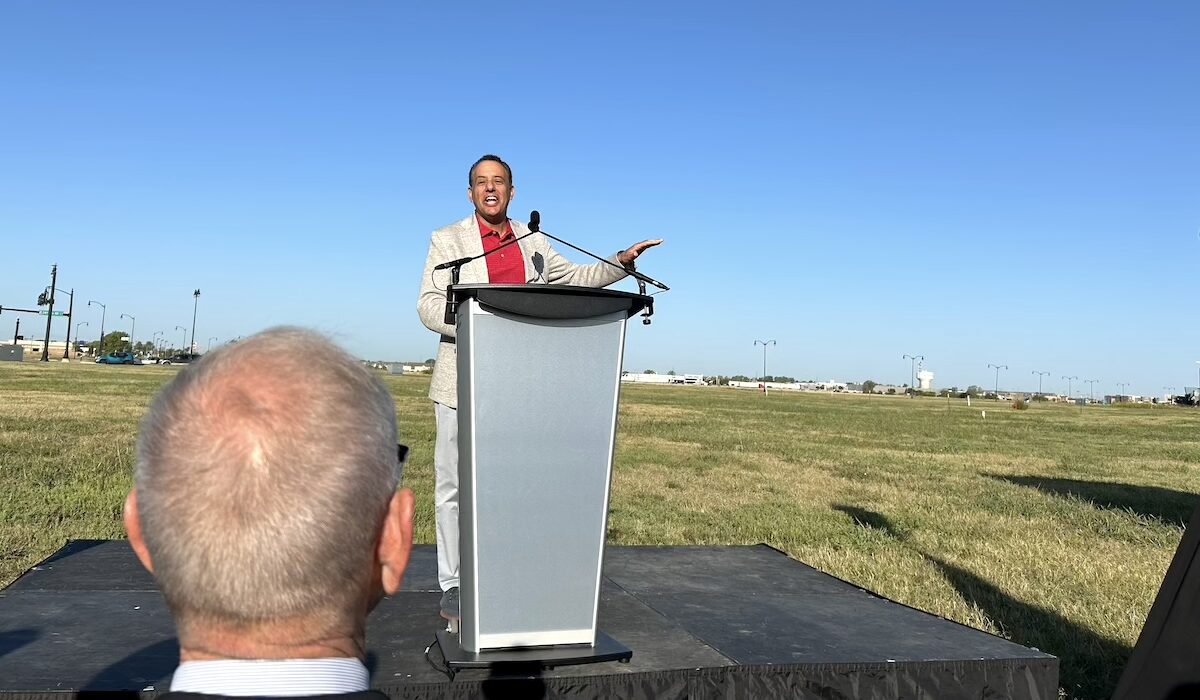
While dozens of OU students have reportedly been paid to “take up room” at City of Norman meetings about a $1 billion project that features public financing for a new sports arena, leaders of the university and the economic development community claim they know nothing about it.
Reporting by Anusha Fathepure of The OU Daily revealed this week that a Norman Economic Development Coalition contractor and the son of a state legislator recruited students to attend September meetings about the $600 million new tax increment finance districts now approved for the arena, housing and retail project.
“If any payments were made to students, or anyone else, it’s worth noting that such practices are common—whether it’s for petition gathering, sign waving, door knocking, etc. This is neither illegal nor unethical,” Lawrence McKinney, president and CEO of the Norman Economic Development Coalition, told The Daily by email. “The narrative that citizens were somehow prevented from speaking is simply false, and we would never condone such behavior. We value public debate as much as anyone, and we look forward to continuing these important conversations.”
One day prior, McKinney had told the student paper that he did not know about OU students being paid to attend city meetings, according to The Daily. OU President Joe Harroz said the same.
But at a billboard unveiling Wednesday, Harroz, Mayor Larry Heikkila and several Norman-based businessmen praised the TIF approval and the arena project as a transformative investment in the community.
“We know it’s a change. We know it is a new move forward. And so we planned on it, worked hard on it, and found an opportunity to do it, including a unique financing component called a TIF,” Harroz said in an empty field across the street from the arena’s intended home.
Heikkila acknowledged the project is controversial among Norman residents, some of whom are now canvassing for signatures in hopes of a February vote to overturn the council’s decision. While petitioners believe they can submit more than 6,098 valid referendum signatures by an Oct. 18 deadline, Heikkila expressed confidence the project will move forward.
“I talked to guys like Mick Cornett. I talked to guys like Quint Studer. These guys went ahead and pushed cities into an uncomfortable situation that the city afterwards is going, ‘Wow, I’m glad we did this,’” Heikkila said. “There’s always a difference in opinions, particularly with Oklahomans, particularly in Norman.”
While Heikkila spoke with media Wednesday, Harroz did not — although he did ask OU students to stand and be recognized at the Sept. 18 Norman City Council meeting for learning “about democracy.”
Asked by NonDoc if people paying students to attend council meetings involving university business raised ethical concerns or warranted a formal inquiry, an OU spokesman claimed to be unfamiliar with the situation.
“The university was not aware of the claims made in the OU Daily article,” said Zack Higbee, assistant vice president of communications.
According to The Daily’s Oct. 1 story, OU sophomore David Echols told students by Snapchat he had “a guy” who would pay students to sit in the council chambers during the meeting:
Sorry it’s so last minute but If any of y’all want to make some money today I have a guy that will pay 15/hour to sit at the Norman city council meeting from 4:30-9:30 you can bring your laptop and do hw or whatever but you can’t say why you’re there if any of y’all are interested pm me.
Two weeks prior, OU graduate Jayke Flaggert, a Choctaw graduate who has worked in Republican politics and who runs Flaggert and Associates Consulting Team, sent his own message offering payment to attend a Sept. 2 meeting, according to The Daily.
If anyone is looking to make easy money tomorrow evening- I’m looking to hire 15 guys to fill seats at a meeting. You can wear shorts and a polo, just chill a take up room in the room, bring your phone/laptop and listen in if you want.
$12/hour, w $50 minimum if the meeting runs short (which is likely). Would need you there at 4:30PM tomorrow- 5 min from Kappa Sig on Gray St.
Both Flaggert and Echols have been President’s Leadership Class members during Harroz’s administration. The Daily’s story Thursday details Flaggert’s communications and professional background, although the source of the money he paid to students is not entirely clear.
Department of Justice opens Tulsa Race Massacre investigation

U.S. Assistant Attorney General Kristen Clarke announced an investigation into the 1921 Tulsa Race Massacre, saw much of the city’s predominantly Black Greenwood District destroyed by white Tulsans. The Sept. 30 announcement signals the first federal investigation into the massacre, the true death toll of which will likely never be known.
Damario Solomon-Simmons, the attorney for the last two living survivors of the massacre, argued the lack of a prior federal investigation was part of a “conspiracy of silence” before praising the Department of Justice announcement.
“Over 10,000 Black people suffered through the massacre, over 15,050 homes and businesses burnt to the ground, over 3,000 people disappeared to never be heard from again,” Solomon-Simmons said. “For our federal government to have never, ever recognized this with an actual report is a travesty. It was a conspiracy of silence that has gone on for decades and decades and decades.”
Solomon-Simmons made his statement during a press conference updating the public on the U.S. Department of Justice’s Civil Rights Division’s cold case investigations under the Emmett Till Unsolved Civil Rights Crime Act, federal legislation that authorized the DOJ to investigate civil rights crimes that occurred before Dec. 31, 1979.
“We acknowledge descendants of the survivors, and the victims continue to bear the trauma of this act of racial terrorism. We have no expectation that there are living perpetrators who could be criminally prosecuted by us or by the state,” Clarke said. “Although a commission, historians, lawyers and others have conducted prior examinations of the Tulsa Massacre, we, the Justice Department, never have.”
Clarke also indicated a report “analyzing the massacre in light of both modern and then-existing civil rights law” should be released by the end of the year.
“It only took 103 years,” Solomon-Simmons said. “But this is a joyous occasion, a momentous day, an amazing opportunity for us to make sure that what happened here in Tulsa is understood for what it was: the largest crime scene in the history of this county.”
The announcement comes after the Oklahoma Supreme Court ruled against survivors in their public nuisance suit against a slew of government entities alleged to have contributed to the massacre. A petition for a rehearing in front of the court was denied by seven justices, with Justice James Edmondson — the sole dissent in the original case — voting to rehear the case and Justice Richard Darby not voting.
Settlement reached in PSO electric rate increase
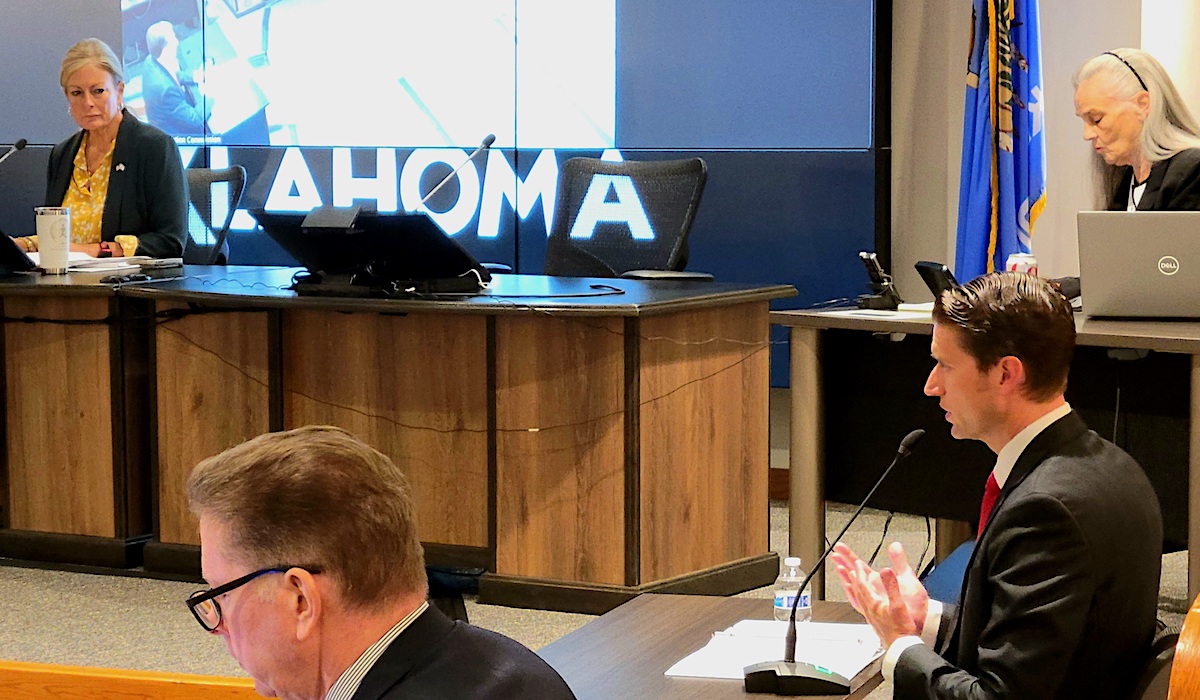
Residential customers of Public Service Company of Oklahoma can expect a $12 monthly increase in their electric bills if the Oklahoma Corporation Commission approves a settlement agreement in one of three pending rate cases for the regulated utility.
An OCC administrative law judge recommended approval of a revised $119.5 million rate increase Thursday. PSO,which serves nearly 573,000 customers in the Tulsa area and other sections of Oklahoma, originally proposed a $218 million rate increase. After five days of discussion, the settlement agreement dropped the average monthly increase from nearly $16 to $12.
“It’s clear to me that the parties did engage in robust negotiation,” ALJ Kenneth Behrens said Thursday. “If you look at the beginning positions, it looks like every party gave and every party moved their position in order to settle this. Looking at this agreement as a whole, I do find that it is fair, just and reasonable and in the public interest.”
The Corporation Commission can accept, modify or reject the settlement agreement, and Commissioner Todd Hiett said he expects commissioners will make a decision by the end of this month.
Brice Betchan, a certified public accountant with the Attorney General’s Office who was involved in negotiations, said the agreement includes a provision that PSO will not file another base rate increase before Jan. 1, 2026.
“This provision ensures PSO’s customers that they will not see additional base rate increases until at least July 2026,” Betchan said. “The attorney general sees this as a valuable concession in the joint stipulation.”
The utility is still seeking approval for two other pending rate increases – $5 a month for a net operating loss case and $7.24 a month to purchase a natural gas combined-cycle generation plant in Jenks.
The PSO settlement comes on the heels of a settlement agreement with OG&E. In June, OG&E reached an uncontested settlement from its original $332.5 million rate request, which would have raised their customers’ average monthly residential bill by $19. Under the $126.6 million settlement, the average monthly OG&E residential bill will increase $9.58.
Broadband Board approves second round of high-speed internet grants
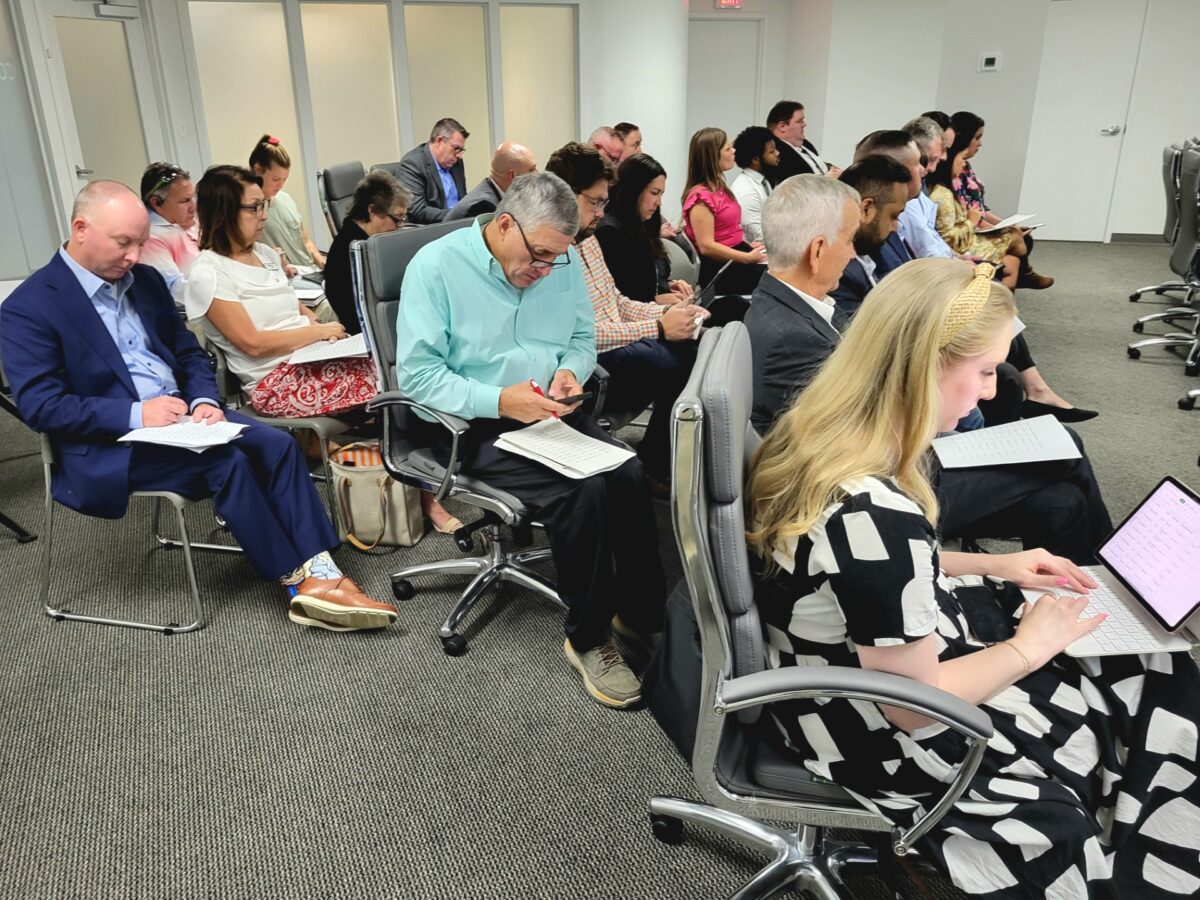
The second round of grants approved last week by the Oklahoma Broadband Governing Board means work is underway — or will start soon — on bringing high-speed internet service to nearly 40 percent of the unserved and underserved homes and businesses in the state, according to the head of the Oklahoma Broadband Office.
“These investments are a game changer for communities that have, for far too long, been left behind in the digital age,” said Mike Sanders, OBO executive director. “We’re moving closer to ensuring that every Oklahoman has access to the high-speed internet essential for success in today’s world.”
The Broadband Governing Board voted Sept. 26 to award about $158 million of American Rescue Plan Act-funded grants, which will help pay for bringing high-speed internet service to about 28,000 homes and businesses, mostly in rural Oklahoma.
Board members gave unanimous approval to 50 grants with 12 internet service providers for projects in 28 counties. The grants will be coupled with more than $109 million in matching funds from the ISPs.
This is the second round of federal funds being awarded for high-speed internet projects. In January, the board approved about $374 million of ARPA funds to 31 ISPs to help fund 142 projects that will bring high-speed internet service to about 55,000 unserved or underserved homes or businesses in 57 Oklahoma counties. Work is underway on most of those projects, said Tim Allen, OBO’s director of communications and media relations. ARPA guidelines require that projects be operational by the end of 2026.
Altogether, more than $500 million in federal grants have been awarded to help bring high-speed internet access to more than 66,000 locations in 57 of the state’s 77 counties, Allen said.
“I want to personally thank Speaker Charles McCall (R-Atoka), Senate Pro Tempore Greg Treat (R-OKC) and the entire Oklahoma Legislature for the vision and foresight to put ARPA monies towards broadband,” Sanders said. “Most of the states didn’t do that, but Oklahoma did. Brilliant!”
A third and final round of awarding federal funds — the largest amount yet — is expected to occur next year when the board plans to award more than $750 million in grants through the Broadband Equity Access and Deployment program. Those funds are to be used to further expand high-speed internet service, mostly in harder-to-reach areas.
Last week’s awarding of projects went much smoother than the board’s first attempt last year. The OBO in September discarded its original proposals after hearing complaints for months from ISPs and growing concerns from its governing board members. A review of the previously proposed projects and supplemental inquiries showed that some of the state’s most challenging geographical areas would not be serviced under the OBO’s original criteria.
Projects approved last week ranged from $73,619 for Dobson Fiber to install high-speed internet service in parts of Jackson County, to $21.2 million for Cox Communications to provide high-speed internet service to parts of Rogers County.
Of the 50 projects, 49 involve using fiber to provide high-speed internet. The other project involves fixed wireless.
Sanders called fiber the “gold standard” when it comes to providing high-speed internet service.
“You can correct speeds, increase speeds a lot better than you can with other technologies,” Sanders said.











